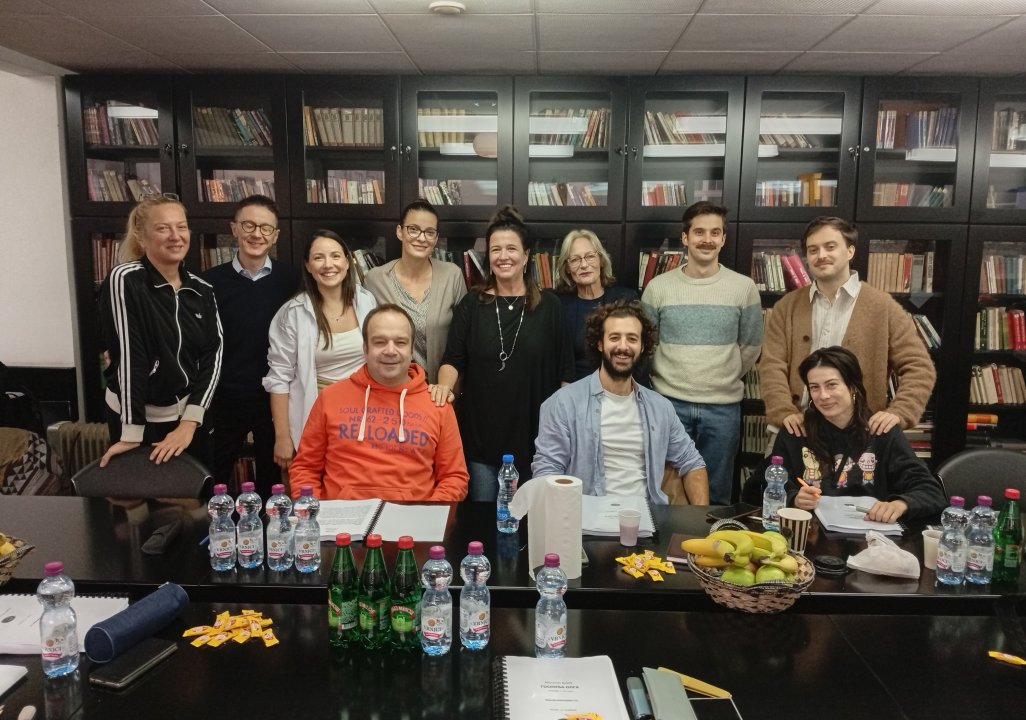Rehearsals of the Play “Mrs. Olga” Have Begun

2 October 2025
At the National Theatre in Belgrade, rehearsals have begun for the play “Mrs. Olga”, based on the text by the great Serbian poet Milutin Bojić and directed by Jug Đorđević. The premiere is scheduled for 5 December on the “Raša Plaović” Stage.
This is a co-production with the National Theatre of the Republic of Srpska in Banja Luka.
Although written more than a century ago, the bourgeois drama “Mrs. Olga” addresses topics that remain highly relevant today — the dominance of capital over morality, moral bankruptcy, and, above all, clash of the generations. The dilemma faced by the young protagonist Gidra largely reflects the spirit of drama and theatre since their very beginnings. Euripides’ Hippolytus, Shakespeare’s Hamlet, Molière’s The Misanthrope, de Musset’s Lorenza¬ccio, and Bojić’s Gidra all share a common question: “Where to place one’s loyalty?” Although set in a drawing room or vineyard at the turn of the century, Bojić’s play, through its treatment of universal themes, resonates easily in any era in which it is performed.
Dramaturge Đorđe Kosić, set designer Dragana Purković Macan, costume designer Velimirka Damjanović, composer Nevena Glušica, stage movement director Milica Cerović, and stage speech coach Dejan Sredojević make the artistic team behind the production. The cast features Nela Mihailović (Olga Ristić), Ljubiša Savanović (Lawyer Novaković), Nikolina Friganović (Mrs. Novaković), Aleksandar Vučković (Gidra), Iva Milanović (Vuka), and Smiljana Marinković (Marija).
“What interests us most in this adaptation is the extent of the collective responsibility of the family — and therefore of society — in raising a young individual who aspires to become a prominent member of the community (in this case, a lawyer), and thus a part of the system that shapes and reshapes that same community. What are the consequences for a society led by unloved children? Furthermore, how much can exposure to secrets, schemes, and manipulation morally compromise a young person, and how much effort is needed to resist and rise from the mud — or is it, after all, a futile struggle?” director Jug Đorđević says.
Milutin Bojić died tragically young, at the age of 25, but in just a decade of creative work (1904–1914), he left behind an impressive legacy: hundreds of poems, seven plays, and dozens of critical essays — a total of about 1,800 pages of manuscript. Jovan Hristić, one of Serbia’s most renowned theatre scholars, wrote of Bojić as a writer who appeared at the end of a literary and civilizational era, “on stage in the final act of the play,” and who “thus, had to speak loudly, for the curtain was about to fall.”
Indeed, Bojić’s works — as dramaturge Đorđe Kosić points out — were often written in a passionate, resonant, and recitative tone; his verses seem made to be recited before a large audience rather than read in solitude.
“However, in the field of drama, where Bojić alternated between writing historical plays in verse and social dramas in prose, there remains one true gem of remarkably modern sensibility — the play Mrs. Olga. Only the concept of the play has survived; the final version was lost during World War I in the National Theatre, where Mrs. Olga was to be staged following the great success of Bojić’s The King’s Autumn on the same stage. Even in its fragmentary form, Hristić refers to the text as perhaps the best bourgeois drama in Serbian literature, with authentic Belgrade speech as a particularly valuable feature of its dialogue. Had the war begun a year later, this satirical comedy — free of the era’s pathos, showing that Bojić mastered the character psychology and deep understanding of the mentality of his people, written under the influence of Ibsen and using sophisticated dramaturgical techniques — would likely have marked a milestone in our dramatic literature. Still, even unfinished, the play offers vitality and interpretive richness, and thus returns to where it was originally meant to be staged — at the National Theatre, first in 1979 directed by Vida Ognjenović, and now once again today,” Đorđe Kosić reminds us.
Similar news
Rehearsals for the Play “The Humour Headquarters” Have Started
Rehearsals of the Play "The Master and Margarita" Directed by Andraš Urban Have Started
Rehearsals of Željko Hubač's Play "I Dreamed That I Woke Up" Directed by Dino Mustafić Have Started
Rehearsals of the Play "Millennium in Belgrade" Started at the National Theatre in Belgrade

